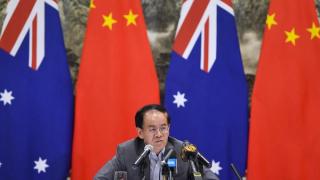We all know the adage: if you find yourself in a hole, stop digging. That is the folly of Beijing ordering ambassador Cheng Jingye to issue the threat that Chinese consumers might boycott Australian products and services in retaliation for Australia pushing for an investigation into the origins of COVID-19 and its initial spread.
If Beijing's objective is to minimise criticism and deflect responsibility for its recklessness in unleashing a devastating pandemic, then it has erred with respect to target, issue and timing.
If Beijing's objective is to minimise criticism and deflect responsibility for its recklessness in unleashing a devastating pandemic, then it has erred with respect to target, issue and timing.
Australian Foreign Minister Marise Payne is correct that the comments amount to "economic coercion", and she should be praised for refusing to mince her words. It is an attempt at coercion by Beijing because any significant reduction in the purchase of Australian exports cannot occur without direct involvement of the regime, as it is achieved through changes in domestic regulations or formal advisories.
Beijing frequently issues such threats to countries, and will occasionally make good on them. In this case, Cheng's public comments are foolish because they remove the element of plausible deniability - which allows China to pressure governments to quietly alter their policies and messages without appearing as if they have been cowed into doing so. Furthermore, an important component of Beijing's messaging strategy is to emphasise how China is suffering with the rest of the world, and that we are all in this together.

Over issues such as the banning of Huawei from the 5G rollout and the introduction of foreign interference legislation, Canberra has shown it is not for turning. If Australia is unlikely to walk away from calling for an international investigation, one would expect Beijing to seek to deprive that issue of oxygen in international discourse as much as possible.
Yet Cheng's comments have been quickly and prominently picked up by the global press at a time when scepticism of and anger towards China's Communist Party is growing. If these threats are carried out, Beijing will be condemned as vengeful. If they are not, it has still shown an angry face the party has been trying to conceal.
If these threats are carried out, Beijing will be condemned as vengeful. If they are not, it has still shown an angry face the party has been trying to conceal.
Either way, the chances that other countries will support Australia's call for an international inquiry are increasing.
Now consider the poor timing and nature of the threat. As in North America, Europe, Japan, Taiwan and some south-east Asian countries, there is burgeoning national conversation about the perils of over-dependency on China. Strategic types have long warned against this but have encountered resistance from the business community. With respect to the latter, tolerance for changing one's approach is low when globalisation is humming along, profits are good and opportunity is expanding. Why change business-as-usual and long-standing risk management approaches when things are going well?
Downturns always lead to the changing of older mindsets.
Only the most blinkered or sheltered expect the world to snap back to the way it was in geopolitical and economic terms when the pandemic passes.
Businesses might not like it, but there is a growing acceptance that exogenous factors leading to disruption are a new normal.
These might be caused by a pandemic, notions of national resilience and a reorganisation of supply chains, or, as in this case, strategic and security frictions between countries.
Rather than bemoan the world we live in, company boards and senior management will be expected to adjust and reformulate risk management strategies to consider exogenous factors.
Issuing economic threats against Australia has only reinforced the lesson that a diversification plan is more important than ever.
Beijing is fighting a mighty battle to win the post-COVID-19 peace by playing down the need for countries and firms to diversify away from China.
But issuing economic threats against Australia has only reinforced the lesson that a diversification plan is more important than ever.
Bear in mind that the issuing of such blunt threats does not serve the grander designs of the Communist Party. Plans such as the Belt and Road Initiative and Made in China 2025, which applies to high-tech and advanced sectors, are unashamedly Sino-centric.
As the sales pitch goes, regional connectivity and global innovation are based around a Chinese-led ecosystem, but this will bring guaranteed benefits for all participants. This is part of Xi Jinping's "community of shared future for mankind", which lauds both China's governance model and its emergence as a global leader.
In this context, the problem for China is that Cheng's comments draw attention to how much Beijing is trying to hide when it comes to scrutiny of its domestic institutions and the making of momentous decisions of global consequence.
Moreover, they remind Australia and the world that the Communist Party views supposedly mutually beneficial economic transactions as the offering of Chinese largesse that can arbitrarily be withdrawn. This is not a "shared future for mankind" that has much appeal.
The pandemic will eventually subside but impressions of how nations and governments have acted and behaved during the trauma will endure.
Regrettably, Beijing is crafting a rod for its own back when the world recovers.





